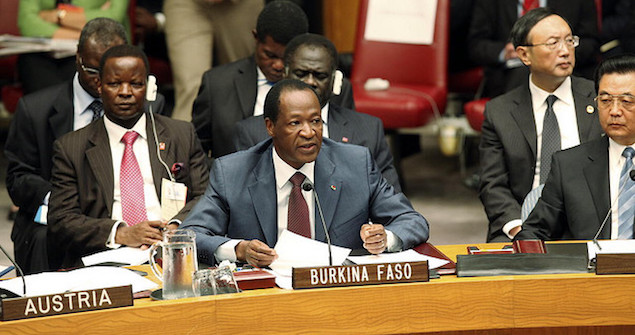Australia’s Presidency of the Security Council: Responding to Unrest in Burkina Faso

Eleanor Walsh examines Australia’s response as the Security Council president to unrest in Burkina Faso.
During November, Australia had the responsibility, and the privilege, of being the Security Council’s President. Thus, the month of December presents an ideal opportunity to reflect upon its contribution to international affairs.
During its two years on the Council, Australia’s representatives have dealt with a number of issues of great concern to Australians. These include foreign fighters, the downing of flight MH17 and the Ebola virus. While these issues grab the headlines on almost a daily basis (and loom large in the minds of everyday citizens) the issues that have come under Australia’s aegis have been wide-ranging and diverse. One of these has been the recent political unrest in the West African nation of Burkina Faso.
The benefits of engaging with African nations are gaining Australia’s recognition, even if it is not a part of the world that has occupied much attention at home. Indeed, as a former French colony, Burkina Faso is more present in the minds of the francophone world. There is no Australian diplomatic presence in Ouagadougou. However, Australia’s dealings with this far away nation have been consistent with its stated mission at the UNSC: Australia: Making a difference for the small and medium countries of the world.
The three decades that followed Burkina Faso’s independence in 1960 were marked by political unrest. In 1987, presidential aide Blaise Compaoré led a coup d’état that resulted in the death of president Thomas Sankara. Soon after, the new leader introduced limited democratic reforms, standing for election in 1991.
Compaoré would ultimately serve four terms in office. His presidency was a comparatively stable period of Burkina Faso’s history and he remained largely unchallenged until July 2013 when suspicions arose that he was attempting to extend his time in power. These came to a head in October 2014 when the President proposed changes to the constitution that would enable him to seek a fifth term in office.
Mass demonstrations erupted in Ouagadougou and, despite new pledges that the constitution would remain unchanged, opposition leaders and members of the military continued to call for an end to Compaoré’s rule. Under pressure from all sectors of Burkinabe society, Blaise Compaoré resigned as president on 31 October. After Lieutenant-Colonel Isaac Zida assumed control of Burkina Faso’s government, the Australian-led UNSC was quick to respond, emphasising its desire for a speedy transition to a civilian-led and democratically elected government.
These calls were heeded as members of the opposition, military leaders and civil society groups came together to sign the Charter for the Transition in Burkina Faso. Acting as UNSC president, Gary Quinlan, Australia’s permanent representative at the UN, was swift to commend the announcement that former minister of foreign affairs and UN permanent representative, Michel Kafando, would be appointed as civilian president. Lieutenant-Colonel Zida was selected to act as his prime minister. The new interim president quickly confirmed that elections would take place later next year.
As for Compaoré, he and his family fled first to Cote d’Ivoire, then Morocco. While there have been calls, most notably from the prime minister, for his extradition to face charges relating to the death of former president Sankara, interim president Kafando stated that this is not the government’s first priority.
In a continent where regime changes can often be violent and bloody, western governments have been cautiously optimistic about this relatively peaceful transfer of power. France and the US have joined the UN in congratulating the interim president. However, behind this optimism lies a different set of concerns, concerns that will perhaps figure more highly in the minds of the Australian government and its people.
Under Compaoré’s leadership, Burkina Faso became a useful ally in Western Africa in promoting regional stability. He played a key role in resolving violent conflict in neighbouring Cote d’Ivoire and was a voice of reason in the face of turmoil in Guinea. In terms of international security, the government of Blaise Compaoré was credited as being an important ally in combatting terrorist organisations such as Al-Qaeda in the Islamic Maghreb. His country has also played host to US surveillance networks as well as French special forces, the latter being key in France’s military intervention in Mali in 2012.
Australia, through its presidency of the UNSC, has encouraged and supported the peaceful resolution of the unrest in Burkina Faso. However, we will all have to wait to see what impact these events will have on international and regional security before the elections in Burkina Faso next year.
Eleanor Walsh is a research intern at the AIIA National Office. She can be reached at elewalsh@hotmail.com.


